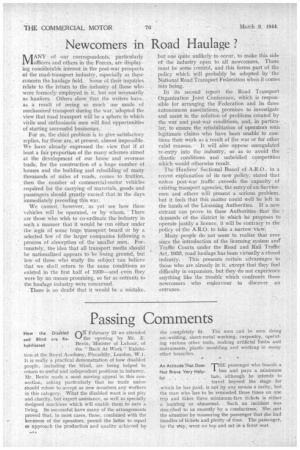Newcomers in Road Haulage ?
Page 16

If you've noticed an error in this article please click here to report it so we can fix it.
MANY of our correspondents, particularly officers and others in the Forces, are displaying considerable interest in the post-war prospects of the road-transport industry: especially as these concern the haulage field. Some of their inquiries relate to the return to the industry of those who were formerly .employed in it, bin not 'necessarily as hauliers. Others show that the writers have, as a result of seeing so much use made of mechanized transport during the war, adopted the view that road transport will be a sphere in which virile and enthusiastic men will find opportunities of starting successful businesses.
For us, the chief problem is to give satisfactory. replies, for these are, at present, almost impossible. We have already expressed the view that if at least a fair proportion of the many schemes aimed at the development of our home and overseas trade; for the construction of a huge number of houses and the building and rebuilding of many thousands of miles of roads, comes to fruition, then the number of commercial-motor vehicles required for the carrying of materials, goods and passengers should greatly -exceed that in the days immediately preceding this war. • We cannot, • however, as yet see how these vehicles will be operated, or by whom. ' There are those who wish to co-ordinate the industry in such a manner that it wciuld be run either under the wgis of some huge transport board or by a selected feW of the larger companies following a process of absorption of the smaller men. For-. tunately, the idea that all transport media should be nationalized appears to be losing ground, but few of those who study the subject can believe that we shall .return to the same Conditions as existed in the first half of 1939—and even They were by no means promising, so far as entrants to the haulage industry were concerned.
There is no doubt that it would be a 'mistake, but one quite unlikely to occur, to make this side of the industry open to all newcomers. There must be some control, and this forms part of the policy which will probably be adopted •lay the National Road Transport Federation When it comes into being.
In its second • report the • Road Transport Organization Joint Conference, which is respon sible for arranging the Federation and its three autonomous assoaations, promises to investigate and assist in the solution of problems created by the war and post-war conditions, and, in particii lar, to ensure the rehabilitation of operators with legitimate claims who have been unable to con tinue their work as a result of the war or for other valid reasons. It will also opposeunregulated re-entry into the industry, so as to avoid the chaotic conditions and unbridled 9mpetition which would otherwise result.
The Hauliers' Sectional Board of A.R.O., in a recent explanation of its new policy, statedthat unless post-war traffic exceeds the -capacity of existing transport agencies, the entry of ex-Servicemen and others will present a serious problem, but it feels that this Matter could well be left in the hands of the Licensing Authorities. If a new entrant can prove to these Authorities that the demands of the district in which he proposes to operate justify a licence, it will be contrary to the policy -of the A.R.O. to take a narrow -view.
Many people, do not seem to realize that ever since the introduction of the licensing system and Traffic Courts under the Road and Rail Traffic Act, 1933, road haulage has been virtually a closed industry. This presents certain advantages to those who are already in it, except•that they find difficulty in expansion, but they do not experience anything like the trouble which confronts those newcomers who endeavour to discover an entrance.




















































